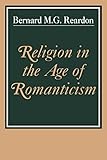Religion in the age of romanticism : studies in early nineteenth century thought / Bernard M.G. Reardon. [print]
Material type: TextPublication details: Cambridge [Cambridgeshire] ; New York : Cambridge University Press, (c)1985.Description: ix, 303 pages ; 24 cmContent type:
TextPublication details: Cambridge [Cambridgeshire] ; New York : Cambridge University Press, (c)1985.Description: ix, 303 pages ; 24 cmContent type: - text
- unmediated
- volume
- 9780521300889
- 9780521317450
- BT83
- BT83.R288.R455 1985
- COPYRIGHT NOT covered - Click this link to request copyright permission:
| Item type | Current library | Collection | Call number | Status | Date due | Barcode | |
|---|---|---|---|---|---|---|---|
 Circulating Book (checkout times vary with patron status)
Circulating Book (checkout times vary with patron status)
|
G. Allen Fleece Library CIRCULATING COLLECTION | Non-fiction | BT83.67.R43 1985 (Browse shelf(Opens below)) | Available | 31923001509039 |
Romanticism, idealism and religious belief -- Schleiermacher on the religious consciousness -- Hegel and Christianity -- The idea of God in the philosophy of Schelling -- German Catholic theology in the romantic era -- Italian ontologism: Gioberti and Rosmini -- Lamennais and Paroles dun Croyant -- Auguste Comte and the religion of humanity -- Ernest Renan and the religion of science.
This book presents studies of early-nineteenth century religious thought in Germany, France and Italy in so far as it reflected the influence of the Romantic movement. Romanticism may be notoriously difficult to define, but the cast of mind usually associated with it - manifest in philosophy, theology and social theory as well as in literature, music and the visual arts - is never hard to detect, even though the forms of its expression may vary widely. The authors considered, including Schleiermacher, Hegel, Schelling, Rosmini, Lamennais, Renan and Comte, all took religion seriously as voicing a fundamental impulse of the human spirit, even if the doctrines and institutions of Christianity had in their view to be either radically modified or else rejected outright. They were not satisfied with what they were apt to regard as the 'soulless' rationalism of the preceding century, as equally they feared the growing encroachment of natural science upon the freedom and indeed the self-identity of the human consciousness. A middle way, they sensed, had to be found - one grounded in man's moral and aeshetic experience - between the old orthodoxy and sterile unbelief.
COPYRIGHT NOT covered - Click this link to request copyright permission:
There are no comments on this title.
